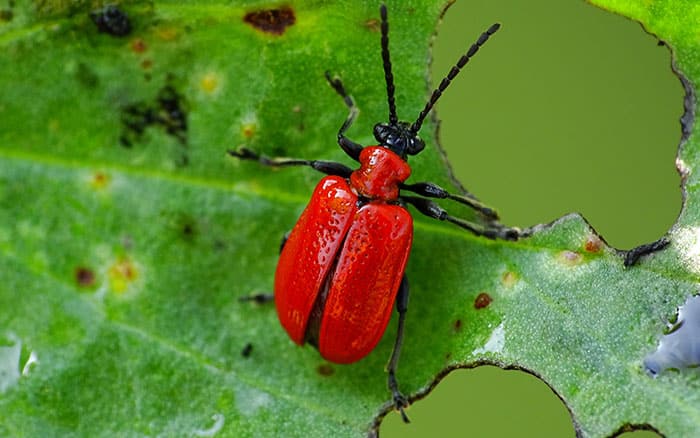Lilies are a magnificent flower – a sublime addition to any garden.
But a small red scourge known as the lily beetle can put an end to your joy in no time.
Lily beetles, or Lilioceris lilii, are pesky creatures that will take a little effort to get rid of, so I thought I would give you a few quick tips.

Methods
You can remove the eggs, larvae and adult beetles by hand, and it’s very effective if you have only a few lily plants. Pesticides can also be effective, but most will cause damage to the environment as well as other beneficial insects and creatures. Certainly do not spray when plants are flowering because you will affect pollinating insects.
Neem Oil and Spinosad are two environmentally friendly options that you could research.

However, even with pesticides, you will probably still have to do some manual work to get rid of these determined little critters. I’d recommend wearing latex gloves for the extra grip, and because the larvae are slimy and covered in excrement.
Eggs
Eggs, which are orange-red and sausage-shaped, are laid in batches on the underside of leaves, and you have 7-10 days to catch them before they hatch. They are not that easy to crush, but you can either try to scrape them all off, or pull the whole leaf off and put it in soapy water to kill them.
Larvae
Larvae are the most difficult to control, and the most resistant to sprays. If you have a lot of larvae you may have to patrol daily until they are under control. They are not easy to squash either, so you may find, again, that sometimes you want to take the whole leaf off and put it in a jar.
Adults
To catch the adult beetles you must be vigilant and fast. As soon as they sense movement, the speedy little creatures will immediately drop to the soil level and lie on their backs, which makes them very difficult to spot. Use this habit against them by holding a jar of soapy water under them and nudging them off the leaf. They will immediately fall into the water. Scout your plants several times a week, especially early in the season as the adults emerge from the soil.

Leave A Comment